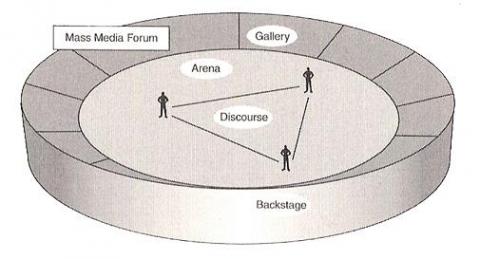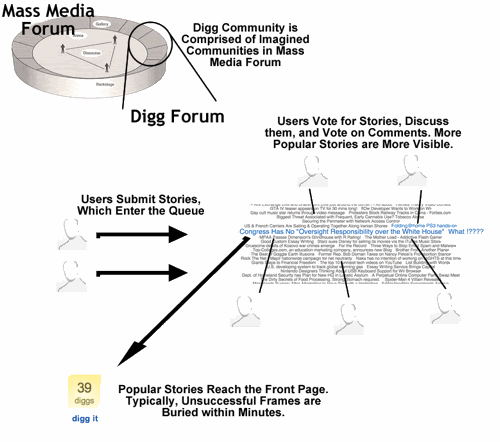
Social Media Opportunities for Social Movements
Traditional mass media forums provide few opportunities for weak social movement organizations to advance their frames. As a result, organizations without sufficient resources are largely absent from public discourse in the mass media forum. Fortunately, social media sites that rely on user-generated content create forums for more democratic public discourse, and the high visibility of user-generated content and conversation promotes a sense of collective identity and power. How can social movement organizations best take advantage of these forums to promote their own stories and frames, and encourage activism?
As a "master forum," in which organizations fight over air time for their preferred frames, the traditional media serves a dual role. First, it is an indicator of cultural changes in civil society. Participants in other forums look to the mass media to assess their own effectiveness, measured by whether or not their opinions were featured and whether they received positive or negative comments. Second, it effects changes in civil society. Paul Chilton identifies critical discourse moments as events that bring issues into the forefront of public discourse, providing an opportunity to reassert existing frames or provide new frames for those issues. Of course, access to air time is not equal, and powerful organizations with greater resources have an advantage.
Take the current economic crisis as an example. Traditional media serves as an indicator of changes in our economic institution, and heavily shapes the national conversation about the crisis. Powerful actors such as the McCain and Obama campaigns, and Wall Street investing firms are quoted often. But as a critical discourse moment, weaker collective actors such as social movement and neighborhood organizations may have the opportunity to frame the crisis in their own terms.
Social media web sites play an important role by challenging the traditional media's dominance as a master forum and by creating a space in which groups and individuals on the margins of democratic power have more opportunities to frame stories using fewer resources than in the traditional media forum. This is because social media sites primarily publish user-created or user-aggregated news content. Furthermore, these sites encourage the user community to vote on and promote content to the front page, rather than an editor. (By this definition, Open Media Boston would not be considered a social media site. Although OMB actively solicits contributions from its audience, editors promote stories to the front page themselves.) This means that the audience is actively involved in finding and creating content, and deciding which stories are worth featuring. Audience members are "prosumers."

The Digg forum model relies on user participation.
Slashdot fits the above definition, but it focuses on technology news rather than social issues. Likewise, Digg started as a technology news site, but has expanded to include social and political issues, including tools that feature US election 2008 news. As they have become more popular, Slashdot, and especially Digg, which has more mainstream appeal, have become important forums for framing contests. As the communities have grown, however, "power users" have amassed greater access to the front page than other users. Users have developed strategies to game the system, and when the rules are changed, those users challenge them. All this is to say that although the playing field in this arena is more level, it is not flat; social movement organizations must fight power users and community disinterest or opposition to successfully promote their stories and frames.
Two social media sites similar to Slashdot and Digg, but which feature progressive news, should be of particular interest to social movement organizations. NewsCloud is an ambitious, attractive site whose mission is "to provide a diverse spectrum of must read stories, breaking news, and opinion from around the world," offers the code from its open source platform for download. Stories make it to the front page with about forty votes. Like Slashdot, users can rate comments on several dimensions (insightful, interesting, funny, inaccurate, spam, etc.), but there are few comments to be rated. NewsCloud is ranked 91,233 by Alexa (Digg is currently 169; Slashdot is 6,809; OMB is about 2.3 million), so it has a relatively large readership, but its community is still small enough that quality content can likely be promoted by non-power-users. Additionally, social movement organizations can take advantage of the lack of discussion in the comments sections, posting comments with their preferred frames.
BuzzFlash, a "user driven progressive political news website," is also open source, based onMeneame. Unlike many other social media sites, BuzzFlash publishes a detailed explanation of their promotion algorithm, which uses "karma" levels determined by user and community activity. Stories make the front page with about 20 "buzzes," less than on NewsCloud, but the comments sections are more active. Ranked 23,847 by Alexa, BuzzFlash draws a larger audience than NewsCloud, and social movement organizations would be wise to promote their stories and frames on the site.
While social media sites, and progressive social media sites in particular, are important tools for social movements, I can't help but feel that even the best of these services have failed to create tools that turn readership and participation into direct social action. BuzzFlash users sometimes offer great information and ideas in their comments, but the site provides no embedded tools for users to take action, and even forbids HTML in its comments, limiting users' options for sharing information and ideas. If democratizing access to media forums is a necessary step towards engaging audiences in taking action on social issues, making these prosumers' ideas actionable by way of embedded activist tools logically follows. Social movements will get a big boost in activity when social media sites allow users to post "sign the petition," "donate," and "arrange a meet-up" buttons in their comments and alongside popular stories. Until then, users must take action manually, off site.

